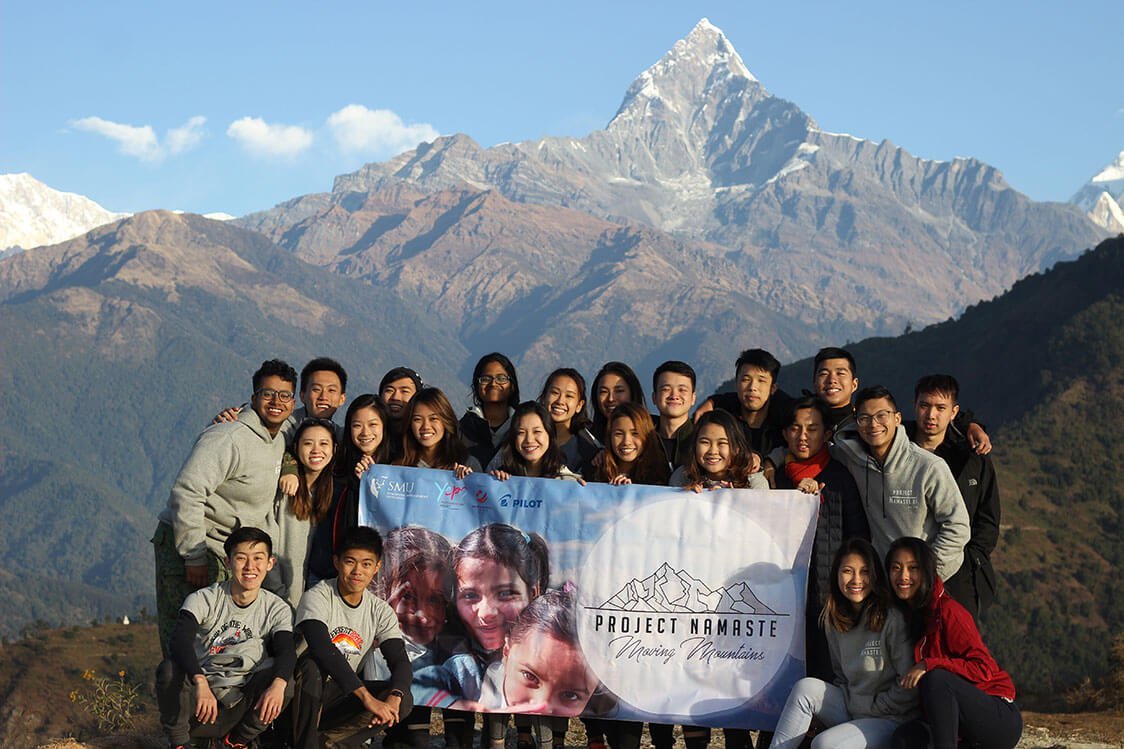
Give a man a fish and you feed him for a day. Teach a man to fish and you feed him for a lifetime. This adage forms the foundation upon which Project Namaste was built.
What started as one student’s desire to do community service in Nepal more than a decade ago has since sparked a mission to build a conducive and self-sustaining educational environment for Nepali youth. The brainchild of Ivy Wong, then a double degree business and accountancy student at SMU, the first edition of Project Namaste saw more than 20 SMU students conducting English learning activities and building a library for a Nepalese village school in Pokhara in 2006.

Since then, each edition of the project has gone from strength to strength. Project Namaste has extended far beyond raising funds for educational materials or enhancing learning spaces. From inculcating a love for English through interactive games and illustrated dictionaries, to teaching students crucial life skills such as confidence and critical thinking, each Project Namaste team stays focused on a single vision—to give students in Pokhara the opportunity to take ownership of their learning and broaden their horizons in life after school.
Now into its 11th edition, the Project Namaste team comprising 22 SMU students headed back to Pokhara over the winter break. We caught up with one of its team members, Chloe Tan, an SMU Lee Kong Chian School of Business undergrad, to find out more.
Tell us more about Project Namaste XI.
We worked with Gyan Jyoti Secondary School for the third time because based on our recce in June, we discovered that there were still learning gaps that Project Namaste can help to bridge.
Nepal is the midst of transitioning its education system to an English medium one where all lessons will be taught in English. However, having undergone a full Nepali education, the teachers themselves may find it hard to adapt to such a huge change.
This is where Project Namaste comes in. Our goal is to spark the students’ interest in English while helping the teachers smoothly transition to the new system by sharing how English is taught in Singapore.


To what extent is Project Namaste more than just a trip to build a school? How have the projects contributed to the community over the years?
We strongly believe that we are students, not builders. Our assets as students lie in the knowledge and skills we have been blessed with, thanks to Singapore’s education system. Instead of building a physical school with skills we might not even possess, we can better contribute by sharing the knowledge we have acquired over the years.
Although Project Namaste has also extended its support to the community at large by improving cooking stoves for families and creating a micro business plan for sustainability in the village, our focus remains on the students.
Based on our discussions with the Pokhara Chamber of Commerce and Industry, nurturing students is the best way to help the community because the kids can share their takeaways within the community. A proper education also improves their prospects of securing jobs in neighbouring countries such as Dubai.
What have been the biggest challenges you’ve faced so far planning for Project Namaste?
The biggest challenge we’ve faced so far would probably be how we can continue to add value to the previous editions.
Another challenge is ensuring the sustainability of our programmes. We need to think beyond just facilitating two weeks of programmes at the partnering school, and find ways to ignite the students’ interest in English so that the passion for the language will grow even after we’ve left Nepal.

How has this initiative evolved since its inception 11 years ago?
Every Project Namaste is different, depending on the needs of the school we partner with that year. However, the vision and mission of Project Namaste has remained the same since its inception 11 years ago. The only thing that changes each year is our renewed passion and our perspective when we see the smiles on the faces that we have made an impact on.


